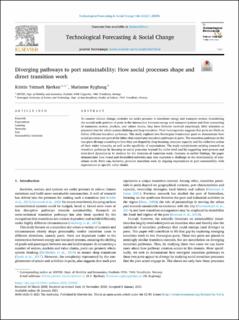| dc.contributor.author | Bjerkan, Kristin Ystmark | |
| dc.contributor.author | Ryghaug, Marianne | |
| dc.date.accessioned | 2021-02-15T10:43:39Z | |
| dc.date.available | 2021-02-15T10:43:39Z | |
| dc.date.created | 2021-01-26T12:21:18Z | |
| dc.date.issued | 2021 | |
| dc.identifier.issn | 0040-1625 | |
| dc.identifier.uri | https://hdl.handle.net/11250/2728028 | |
| dc.description.abstract | To counter climate change, societies are under pressure to transform energy and transport sectors. Considering the crucial node position of ports in the intersection between energy and transport systems and their connecting of numerous sectors, markets, and values chains, they have hitherto received surprisingly little attention as potential sites for whole system thinking and deep transition. Their heterogeneity suggests that ports are likely to follow different transition pathways. This study explores two Norwegian frontrunner ports to demonstrate how social processes are part of the fabric that constitutes transition pathways in ports. The transition pathways in the two ports diverge according to how they are shaped by deep learning, resource capacity and the collective action of their wider networks, as well as the specificity of expectations. The study complements existing research on transition pathways by focusing on social processes beyond the niche level and by suggesting inter-process and inter-level dynamics to be decisive for the direction of transition work. Contrary to earlier findings, the paper demonstrates how broad and diversified networks may also represent a challenge to the directionality of transitions work. Ports can, however, promote transition work by aligning expectations to port sustainability with expectations in specific value chains. | en_US |
| dc.language.iso | eng | |
| dc.publisher | Elsevier | |
| dc.rights | CC BY 4.0 | |
| dc.rights.uri | http://creativecommons.org/licenses/by/4.0/ | |
| dc.subject | Expectations | |
| dc.subject | Learning | |
| dc.subject | Networks | |
| dc.subject | Port | |
| dc.subject | Sustainability transition | |
| dc.title | Diverging pathways to port sustainability: How social processes shape and direct transition work | |
| dc.type | Peer reviewed | |
| dc.type | Journal article | |
| dc.description.version | publishedVersion | |
| dc.rights.holder | © 2021 The Authors | |
| dc.subject.nsi | VDP::Teknologi: 500 | |
| dc.source.volume | 166 | |
| dc.source.journal | Technological Forecasting and Social Change | |
| dc.identifier.doi | 10.1016/j.techfore.2021.120595 | |
| dc.identifier.cristin | 1879530 | |
| dc.relation.project | Norges forskningsråd: 281002 | |
| dc.source.articlenumber | 120595 | |
| cristin.ispublished | true | |
| cristin.fulltext | original | |
| cristin.qualitycode | 1 | |

